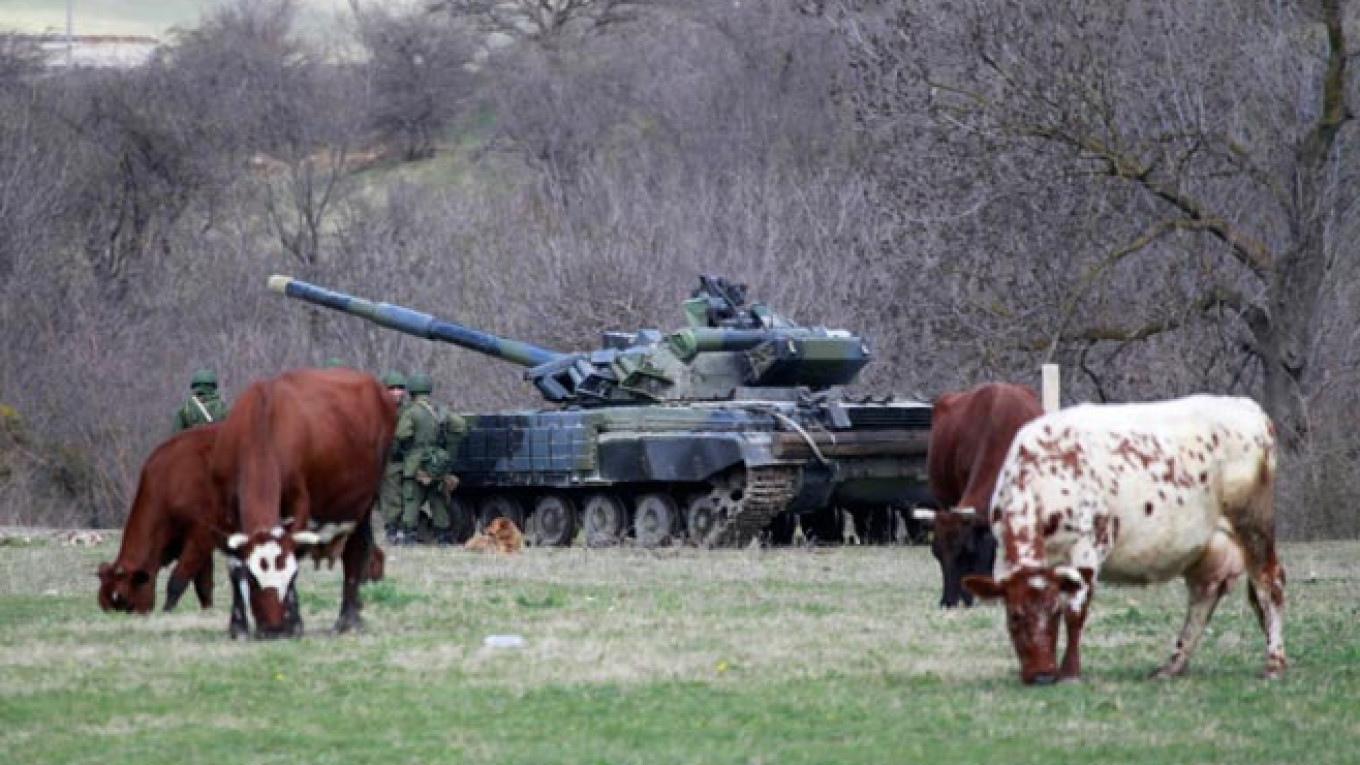President Vladimir Putin discussed the practical implications of Crimea's annexation by Russia with members of the Federation Council on Thursday, reiterating his commitment to ensuring the swift integration of the region into the country.
The meeting addressed the "legal, economic, cultural, social and administrative" components of Russia's acquisition of Crimea, as well as other national finance and infrastructure issues, a statement posted Thursday on the Kremlin's website said.
"We are now facing many questions, which lawmakers are confronted with as well," Putin said. "We must ensure that Crimea and Sevastopol enter our legal system smoothly, carefully, systematically and professionally without creating any problems for people, and while developing the economy and social spheres of these two new subjects of the Russian Federation."
Putin also insisted that Crimean authorities be actively involved in the transition process for the residents of Crimea to feel like "full-fledged citizens of the Russian Federation as quickly as possible."
"We need our citizens in Crimea and Sevastopol to feel that they are not only the focus of our attention, but that they are the subjects of a joint effort," he said.
Russia's Federal Migration Service has contributed to this initiative by automatically recognizing Ukrainian nationals and stateless people who were permanent residents of Crimea as of March 18 as Russian citizens. Residents of Crimea who wish to retain Ukrainian citizenship or remain stateless have one month to opt out of Russia's automatic recognition program.
The migration service also announced Thursday that Russian passport applications for Crimea residents would be free until Jan. 1, 2015.
At a meeting later on Thursday with Prime Minister Dmitry Medvedev, Putin said he was confident that Crimea would become a "self-sufficient" and "economically attractive" region, Interfax reported.
But according to Crimean political scientist Vladimir Dzharalla, attempts to integrate the peninsula into Russia will not be felt for at least another six months.
"Right now many things remain unclear and they will remain this way for many months to come," Dzharalla said in a telephone interview. "Changing passports, school systems and salaries are some of the most complex changes Crimeans will be facing, at least from a social perspective."
The busy activity of the Russian government to integrate Crimea comes as Western powers continue to rebuke Moscow for its annexation of the region, which only a handful of countries around the world have recognized as legitimate.
State Duma Speaker Sergei Naryshkin commissioned a working group on Thursday to study the transition of Crimean educational institutions from the Ukrainian to the Russian education system. Crimean schools will begin teaching the Russian curriculum on Sept. 1.
Lawmaker Vyacheslav Nikonov, who heads the Duma's Education and Science Committee, said the full integration of Crimean schools into the Russian education system would be impossible without amendments to the country's education legislation. Nikonov said Thursday that his committee was working on the required draft amendments to ensure that Crimea fully adopts the system.
Russia's bureaucratic and security apparatuses have also begun operations in Crimea as Crimean authorities expand their cooperation with Moscow.
Officials from Russia's Defense Ministry, Interior Ministry, the Investigative Committee and the Federal Security Service were all in Crimea this week to lay the groundwork for their regional organizational structures. On Tuesday, Russia's Federal Agency for Alcohol Market Regulation began distributing licenses to Crimean alcohol manufacturers.
Russian nongovernmental and social organizations have also demonstrated interest in expanding their activities to Crimea. The Civil Society Development Fund announced that it was planning to open a regional branch in the peninsula within the year.
Contact the author at g.tetraultfarber@imedia.ru
A Message from The Moscow Times:
Dear readers,
We are facing unprecedented challenges. Russia's Prosecutor General's Office has designated The Moscow Times as an "undesirable" organization, criminalizing our work and putting our staff at risk of prosecution. This follows our earlier unjust labeling as a "foreign agent."
These actions are direct attempts to silence independent journalism in Russia. The authorities claim our work "discredits the decisions of the Russian leadership." We see things differently: we strive to provide accurate, unbiased reporting on Russia.
We, the journalists of The Moscow Times, refuse to be silenced. But to continue our work, we need your help.
Your support, no matter how small, makes a world of difference. If you can, please support us monthly starting from just $2. It's quick to set up, and every contribution makes a significant impact.
By supporting The Moscow Times, you're defending open, independent journalism in the face of repression. Thank you for standing with us.
Remind me later.






